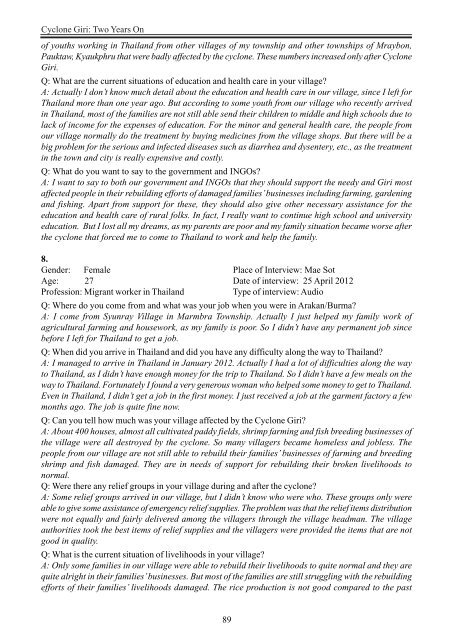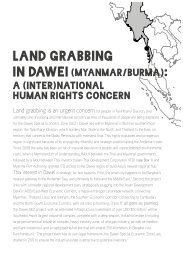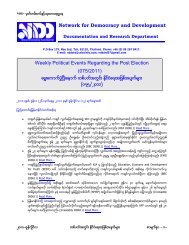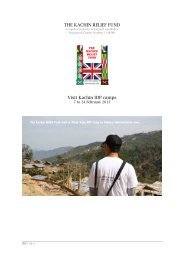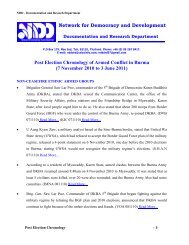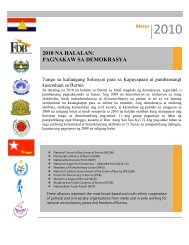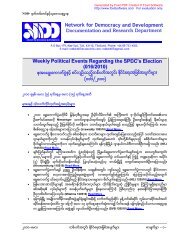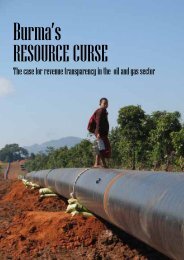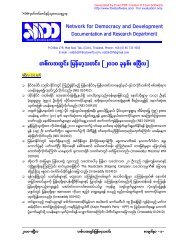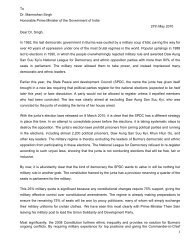Cyclone Giri - Two Years On - Burma Action Ireland
Cyclone Giri - Two Years On - Burma Action Ireland
Cyclone Giri - Two Years On - Burma Action Ireland
Create successful ePaper yourself
Turn your PDF publications into a flip-book with our unique Google optimized e-Paper software.
<strong>Cyclone</strong> <strong>Giri</strong>: <strong>Two</strong> <strong>Years</strong> <strong>On</strong><br />
of youths working in Thailand from other villages of my township and other townships of Mraybon,<br />
Pauktaw, Kyaukphru that were badly affected by the cyclone. These numbers increased only after <strong>Cyclone</strong><br />
<strong>Giri</strong>.<br />
Q: What are the current situations of education and health care in your village<br />
A: Actually I don’t know much detail about the education and health care in our village, since I left for<br />
Thailand more than one year ago. But according to some youth from our village who recently arrived<br />
in Thailand, most of the families are not still able send their children to middle and high schools due to<br />
lack of income for the expenses of education. For the minor and general health care, the people from<br />
our village normally do the treatment by buying medicines from the village shops. But there will be a<br />
big problem for the serious and infected diseases such as diarrhea and dysentery, etc., as the treatment<br />
in the town and city is really expensive and costly.<br />
Q: What do you want to say to the government and INGOs<br />
A: I want to say to both our government and INGOs that they should support the needy and <strong>Giri</strong> most<br />
affected people in their rebuilding efforts of damaged families’ businesses including farming, gardening<br />
and fishing. Apart from support for these, they should also give other necessary assistance for the<br />
education and health care of rural folks. In fact, I really want to continue high school and university<br />
education. But I lost all my dreams, as my parents are poor and my family situation became worse after<br />
the cyclone that forced me to come to Thailand to work and help the family.<br />
8.<br />
Gender: Female Place of Interview: Mae Sot<br />
Age: 27 Date of interview: 25 April 2012<br />
Profession: Migrant worker in Thailand<br />
Type of interview: Audio<br />
Q: Where do you come from and what was your job when you were in Arakan/<strong>Burma</strong><br />
A: I come from Syunray Village in Marmbra Township. Actually I just helped my family work of<br />
agricultural farming and housework, as my family is poor. So I didn’t have any permanent job since<br />
before I left for Thailand to get a job.<br />
Q: When did you arrive in Thailand and did you have any difficulty along the way to Thailand<br />
A: I managed to arrive in Thailand in January 2012. Actually I had a lot of difficulties along the way<br />
to Thailand, as I didn’t have enough money for the trip to Thailand. So I didn’t have a few meals on the<br />
way to Thailand. Fortunately I found a very generous woman who helped some money to get to Thailand.<br />
Even in Thailand, I didn’t get a job in the first money. I just received a job at the garment factory a few<br />
months ago. The job is quite fine now.<br />
Q: Can you tell how much was your village affected by the <strong>Cyclone</strong> <strong>Giri</strong><br />
A: About 400 houses, almost all cultivated paddy fields, shrimp farming and fish breeding businesses of<br />
the village were all destroyed by the cyclone. So many villagers became homeless and jobless. The<br />
people from our village are not still able to rebuild their families’ businesses of farming and breeding<br />
shrimp and fish damaged. They are in needs of support for rebuilding their broken livelihoods to<br />
normal.<br />
Q: Were there any relief groups in your village during and after the cyclone<br />
A: Some relief groups arrived in our village, but I didn’t know who were who. These groups only were<br />
able to give some assistance of emergency relief supplies. The problem was that the relief items distribution<br />
were not equally and fairly delivered among the villagers through the village headman. The village<br />
authorities took the best items of relief supplies and the villagers were provided the items that are not<br />
good in quality.<br />
Q: What is the current situation of livelihoods in your village<br />
A: <strong>On</strong>ly some families in our village were able to rebuild their livelihoods to quite normal and they are<br />
quite alright in their families’ businesses. But most of the families are still struggling with the rebuilding<br />
efforts of their families’ livelihoods damaged. The rice production is not good compared to the past<br />
89


